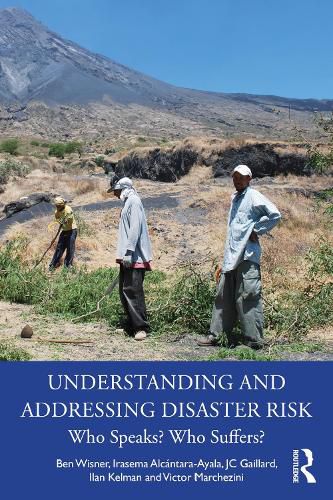Readings Newsletter
Become a Readings Member to make your shopping experience even easier.
Sign in or sign up for free!
You’re not far away from qualifying for FREE standard shipping within Australia
You’ve qualified for FREE standard shipping within Australia
The cart is loading…






In Understanding and Addressing Disaster Risk, the authors explain how people modify the environment and exert power over each other in ways that make nature potentially harmful and put people in harm's way. Opportunities and challenges faced by those engaging with disaster risk are explored.
Across eleven chapters, the authors show that disasters are not natural, are not events, and do not happen quickly. Instead, they are the result of chronic societal processes emerging from the creation and perpetuation of vulnerabilities and limitations on people's abilities to respond to hazards. The book also explores the environmental component of disaster risk through the lens of different natural elements and phenomena, including biological-ecological and water-weather-climate processes as well as geological and outer space dynamics. The authors explain the mutual influence of the different components of disasters in creating disaster risk across diverse regions of the world. They critique attempts to reduce disaster risk through top-down, siloed assumptions, attitudes, and values. The value of people's knowledge of hazards - often ignored or dismissed by authorities - is a central theme. This book is original because of how it re-interprets and advances understanding of the disaster process through the study of such societal processes of vulnerability, risk creation, and power imbalances. It is also unique in diving further into "root causes" of disaster in order to place them within local histories and colonial legacies as well as contemporary, typically misdirected, agendas while upending previous "solutions" which have been shown to do more harm than good.
Understanding and Addressing Disaster Risk is useful for and useable by decision makers, policy makers, researchers and students to shatter the vicious cycle of repeating known mistakes which compound detrimental outcomes.
$9.00 standard shipping within Australia
FREE standard shipping within Australia for orders over $100.00
Express & International shipping calculated at checkout
In Understanding and Addressing Disaster Risk, the authors explain how people modify the environment and exert power over each other in ways that make nature potentially harmful and put people in harm's way. Opportunities and challenges faced by those engaging with disaster risk are explored.
Across eleven chapters, the authors show that disasters are not natural, are not events, and do not happen quickly. Instead, they are the result of chronic societal processes emerging from the creation and perpetuation of vulnerabilities and limitations on people's abilities to respond to hazards. The book also explores the environmental component of disaster risk through the lens of different natural elements and phenomena, including biological-ecological and water-weather-climate processes as well as geological and outer space dynamics. The authors explain the mutual influence of the different components of disasters in creating disaster risk across diverse regions of the world. They critique attempts to reduce disaster risk through top-down, siloed assumptions, attitudes, and values. The value of people's knowledge of hazards - often ignored or dismissed by authorities - is a central theme. This book is original because of how it re-interprets and advances understanding of the disaster process through the study of such societal processes of vulnerability, risk creation, and power imbalances. It is also unique in diving further into "root causes" of disaster in order to place them within local histories and colonial legacies as well as contemporary, typically misdirected, agendas while upending previous "solutions" which have been shown to do more harm than good.
Understanding and Addressing Disaster Risk is useful for and useable by decision makers, policy makers, researchers and students to shatter the vicious cycle of repeating known mistakes which compound detrimental outcomes.